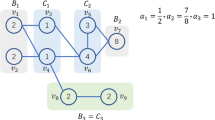Abstract
In a resource sharing system, resources are shared among multiple interconnected peers. Peers act as both suppliers and customers of resources by making a certain amount of their resources directly available to other network participants. Their utilities are determined by the total of resources received from all neighbors. The allocation of the shared resources is determined by a preset mechanism that depends on the information submitted from the agents. The participating agents, however, may try to strategically manipulate its submitted information to improve its utility. In this paper, we consider a tit-for-tat popular proportional sharing mechanism and discuss the incentives an agent may lie, by a so-called vertex splitting strategy, for personal gains. We use the concept of incentive ratio to characterize the extent to which utilities can be increased. For the resource sharing system where the underlying network is a cycle, we prove that the incentive ratio is bounded by \(2\le \zeta \le 4\). Furthermore, the incentive ratio on a cycle with even number of vertices is proved to be exactly 2.








Similar content being viewed by others
References
Adsul B, Babu C, Garg J, Mehta R, Sohoni M (2010) Nash equilibria in fisher market. In: SAGT, pp 30–41
Alkalay C, Vetta A (2014) False-name bidding and economic efficiency in combinatorial auctions. In: AAAI, pp 538–544
Braanzei S, Chen YL, Deng XT, Filos-Ratsikas A, Kristoffer S, Frederiksen S, Zhang J (2014) The fisher market game: equilibrium and welfare. In: AAAI
Cheng Y, Deng X, Pi Y, Yan X (2015) Can bandwidth sharing be truthful? In: SAGT, pp 190–202
Cheng Y, Deng X, Qi Q, Yan X (2016) Truthfulness of a proportional sharing mechanism in resource exchange. In: IJCAI, pp 187–193
Chen N, Deng XT, Zhang J (2011) How profitable are strategic behaviors in a market? In: ESA, pp 106–118
Chen N, Deng X, Zhang H, Zhang J (2012) In incentive ratios of fisher markets. In: ICALP, pp 464–475
Hurwicz L (1972) On informationally decentralized systems. In: McGuire CB, Radner R (eds) Decision and organization: a volume in Honor of Jacob Marshak (North-Holland)
Iwasaki A, Conitzer V, Omori Y (2010) Worst-case efficiency ratio in false-name-proof combinatorial auction mechanisms. In: AMMAS, pp 633–640
Iwasaki A, Katsuragi A, Yokoo M (2011) False-name bidding in first-price combinatorial auctions with incomplete information. In: AAMAS, pp 541–548
Koutsoupias E, Papadimitriou C (1999) Worst-case equilibria. In: STACS, pp 404–413
Misra V, Ioannidis S, Chaintreau A, Massoulie L (2010) Incentivizing peer-assisted services: a fluid shapley value approach. In: ACM Sigmetrics’10, pp 14–18
OpenGarden. http://www.opengarden.com
Polak I (2016) The incentive ratio in exchange economies. In: Chan TH, Li M, Wang L (eds) Combinatorial optimization and applications. COCOA
Roughgarden T, Tardos É (2002) How bad is selfish routing? J ACM 49(2):236–259
Schollmeier R (2001) A definition of peer-to-peer networking for the classification of peer-to-peer architectures and applications. In: P2P, pp 101–102
Saad W, Han Z, Poor VH (2011) Coalitional game theory for cooperative micro-grid distribution networks. In: IEEE ICC
Sybil attack (2005) https://en.wikipedia.org/wiki/Sybil-attack
Wu F, Zhang L (2007) Proportional response dynamics leads to market equilibrium. In: STOC, pp 354–363
Yokoo M (2007) False-name bids in combinatorial auctions. ACM SIGecom Exch 7(1):1–4
Yokoo M, Sakurai Y, Matsubara S (2004) The effect of false-name bids in combinatorial auctions: new fraud in Internet auctions. Games Econ Behav 46:174–188
Acknowledgements
This research was partially supported by the National Nature Science Foundation of China (Nos. 11301475, 11426026, 61632017, 61173011), by a Project 985 grant of Shanghai Jiao Tong University, and by the Research Grant Council of Hong Kong (ECS Project No. 26200314, GRF Project No. 16213115 and GRF Project No. 16243516).
Author information
Authors and Affiliations
Corresponding author
Additional information
A preliminary version of this paper appeared in the Proceedings of the 23rd Annual International Computing and Combinatorics Conference (COCOON), 2017.
Rights and permissions
About this article
Cite this article
Chen, Z., Cheng, Y., Qi, Q. et al. Agent incentives of a proportional sharing mechanism in resource sharing. J Comb Optim 37, 639–667 (2019). https://doi.org/10.1007/s10878-018-0315-5
Published:
Issue Date:
DOI: https://doi.org/10.1007/s10878-018-0315-5




